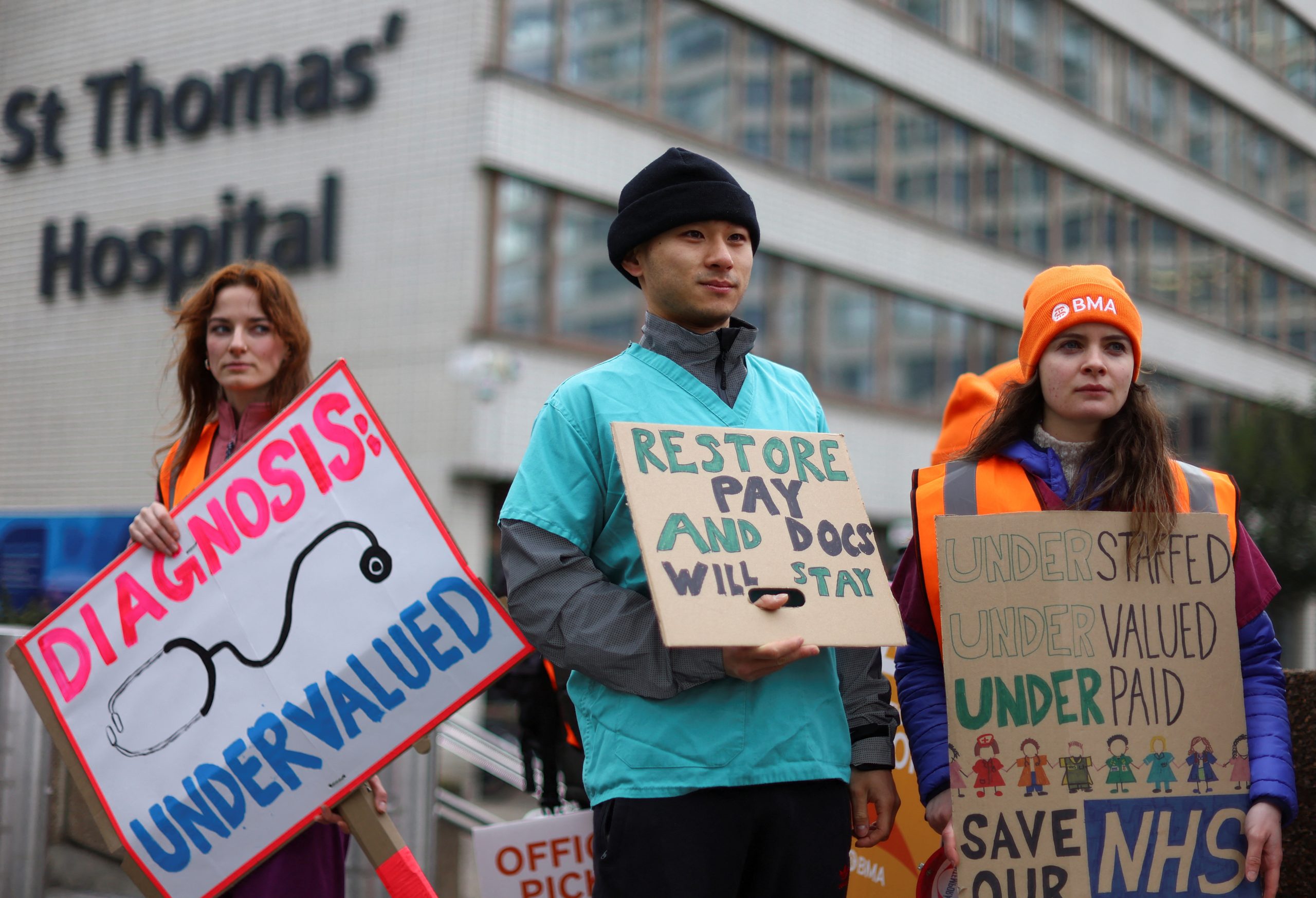
Willie R. Tubbs, FISM News
[elfsight_social_share_buttons id=”1″]
As of this morning, doctors in the United Kingdom are nearing the end of their three-day strike for better wages and help in avoiding burnout, but it is not clear if their efforts will have had their desired effect.
Thousands of junior doctors in Great Britain began a strike on Monday, citing low pay for new doctors in the state-run system.
“Pret a Manger [a British sandwich shop] has announced it will pay up to £14.10 per hour,” an ad from the British Medical Association (BMA) says. “A junior doctor makes just £14.09. Thanks to this government you can make more serving coffee than saving patients. This week junior doctors will take strike action so they are paid what they are worth.”
For context, £14.10 equals about $17.17 in U.S. currency.
The reception from the U.K. government has been, putting it mildly, lukewarm. Health Secretary Stever Barclay has accused the doctors of causing a disruption and demanding “eye-watering” concessions.
Whether or not the doctors appear reasonable depends on which entity or media outlet one consults. The BBC reports the doctors want a 35% pay increase, while the doctors say they want to be boosted from £14.09 to £19 an hour. Both are correct in their math, but one number certainly appears more nefarious.
Late last week, Barclay attempted to barter with the doctors — agreeing to negotiate with them on pay matters if they didn’t make good on their strike threat. This offer was rejected, prompting Prime Minister Rishi Sunak to say he finds it “disappointing that the junior doctors’ union are not engaging with the government.”
The two sides are now talking, but they appear a great distance apart on the matter of money. According to a report from Reuters, salaries for most Brits are up about 5% since November, and generally climbing year over year.
However, UK junior doctors say their wages have declined since 2008 which, taken in conjunction with the stresses and long hours associated with the fight against COVID-19, is making some doctors either leave the profession or seek to leave England.
“Is it any surprise that junior doctors are looking for jobs abroad or in other fields when the government is telling them they are worth more than a quarter less than they were in 2008?” Robert Laurenson and Vivek Trivedi, co-chairs of the BMA junior doctors’ committee, said in a joint statement.
The strike is having a measurable effect on the BMA, which even before the 3-day walkout had seen a surge in membership.
BMA organizations from across the united kingdom have voiced solidarity with the English doctors’ cause.
“The level of dissatisfaction, low morale, and burnout among doctors is as high as it has ever been,” Tom Black, chair of BMA’s Northern Ireland Council, said in a statement. “This is compounded by successive low-pay awards combined with delays in receiving these awards. It also drives young doctors out of the health service to other countries and our more experienced doctors to retire early at a time when we need to recruit and retain them.”
A near-universal message from the strikers is that the British government should shoulder the blame.
“The Westminster Government has shown a reckless dereliction of duty to allow things to reach this stage,” Dr. Chris Smith of BMA Scotland said in a statement. “We only hope the next 3 days of action shows just how serious junior doctors are about the need to finally value us properly and restore our pay to 2008 levels.”
DOCTORS CLASH WITH BBC
The junior healthcare providers are nothing if not equal-opportunity offenders of power structures. The BMA has clashed with both the conservative government and the more progressive BBC in recent days.
On Sunday, BMA accused the BBC of publishing “a number of misleading claims” about the strike in an article that preceded the walkout.
BBC questioned BMA’s math on the 26% pay cut figure and presented evidence that doctors are, as a whole, among the highest-paid employees in the public sector.
BMA took particular exception to a line in the BBC article that reads, “Firstly, no junior doctor has seen pay cut by 26%.”
“This deliberately conflates pay progression — increases to reflect increased skill and experience level — and cost of living increases, which is what pay awards are meant for,” a BMA press release reads. “Since 2008, junior doctor pay in England has been cut in real-terms (RPI) by 26.1%. No doctor is worth less than they were 15 years ago.”
As to the BBC’s reporting that doctors are among the highest-paid employees, BMA said, “It’s unfair to compare junior doctors against the whole of the UK. Junior doctors spend years in training generating huge student loans and face high exam and professional fees. This is why they should be paid what they are worth in 2023.
“A junior doctor starting their job today would be paid just £14.09 per hour — less than someone working in a coffee shop. We’re asking this be increased to £19 per hour — where it should be had the Government not cut junior doctor pay in real-terms year-on-year.”
